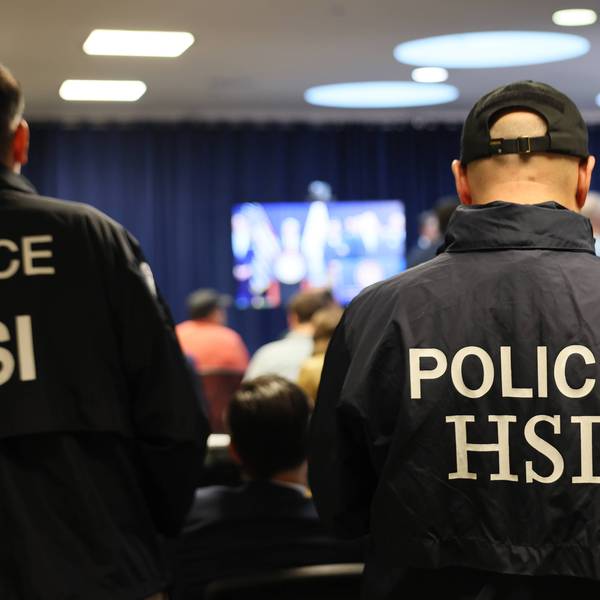
Democratic Rep. Glenn Ivey of Maryland speaks during a press conference to share details of his trip to El Salvador on May 26, 2025.
Maryland Lawmaker Denied Access to Abrego García During El Salvador Visit
The Supreme Court ordered the White House to facilitate Kilmar Abrego García's return to the United States more than a month ago.
"If there is nothing to hide, cut the crap," said a Maryland congressman late Monday after being denied a visit with his constituent, Kilmar Abrego García, who is being held in a prison in El Salvador after being wrongly expelled by the Trump administration to the Central American country.
Rep. Glenn Ivey, a Democrat, said he had made contact with the Salvadoran ambassador before making the trip to El Salvador and had made a formal request to see Abrego García—more than a month after the U.S. Supreme Court ordered the Trump administration to "facilitate" the Maryland resident's return to the United States.
"We came here to visit him today, and now they're telling us we've got to go all the way back to San Salvador to get a permit," said Ivey. "That's ridiculous... They knew we were coming, they knew why we were coming, and they know we have the right to do this."
Abrego García, a Salvadoran national with no criminal record, entered the U.S. without authorization in 2011 and had been living with his wife and children and working as a sheet metal worker in Maryland.
He was one of more than 100 migrants who were swiftly expelled to El Salvador's Terrorism Confinement Center (CECOT) in March under a $6 million deal with Salvadoran President Nayib Bukele.
He was accused of being a member of the gang MS-13, which Abrego García's family has denied. The Trump administration based its actions on an accusation from an anonymous police informant who said in 2019 that Abrego García's Chicago Bulls cap was indicative of his gang membership after he was detained for loitering. That year, a judge ruled that Abrego García should not be deported to his home country because he had a credible fear of torture by a local gang.
The White House has spread misinformation about Abrego García, including an image that was edited to make it appear like his tattoos signified MS-13 membership.
Last Friday, U.S. District Judge Paula Xinis said her repeated efforts to get the Trump administration to disclose information about Abrego García's case has been "an exercise in utter frustration."
Department of Justice lawyers told the judge that details about the case are protected under "state secrets" privileges.
Xinis called on the government to provide legal reasoning for invoking those privileges and said she would issue an official order.
Administration officials have alternately claimed they have no way of returning him to the U.S. after he was deported due to an "administrative error," and Bukele has said the same. But Chief Judge James Boasberg of the U.S. District Court in Washington, D.C. questioned a Department of Justice lawyer earlier this month about President Donald Trump's claim that he could bring Abrego García back to the U.S. with a phone call.
Abrego García was initially sent to CECOT, which is notorious for its poor conditions and reports of torture and physical abuse, but just before U.S. Sen. Chris Van Hollen (D-Md.) visited him in April, he was moved to a lower-security prison.
Ivey said Monday that he had planned to assess the conditions of the facility during his visit, noting the Democrats in Congress have not received information about how U.S. taxpayer dollars are being spent to house Abrego García.
"We need to get that," Ivey said in a press briefing. "We've got the power in the purse. We've got a constitutional obligation to make sure that money is being used in the right way, but we can't figure that out if we don't even know how much is being spent."
An Urgent Message From Our Co-Founder
Dear Common Dreams reader, The U.S. is on a fast track to authoritarianism like nothing I've ever seen. Meanwhile, corporate news outlets are utterly capitulating to Trump, twisting their coverage to avoid drawing his ire while lining up to stuff cash in his pockets. That's why I believe that Common Dreams is doing the best and most consequential reporting that we've ever done. Our small but mighty team is a progressive reporting powerhouse, covering the news every day that the corporate media never will. Our mission has always been simple: To inform. To inspire. And to ignite change for the common good. Now here's the key piece that I want all our readers to understand: None of this would be possible without your financial support. That's not just some fundraising cliche. It's the absolute and literal truth. We don't accept corporate advertising and never will. We don't have a paywall because we don't think people should be blocked from critical news based on their ability to pay. Everything we do is funded by the donations of readers like you. Will you donate now to help power the nonprofit, independent reporting of Common Dreams? Thank you for being a vital member of our community. Together, we can keep independent journalism alive when it’s needed most. - Craig Brown, Co-founder |
"If there is nothing to hide, cut the crap," said a Maryland congressman late Monday after being denied a visit with his constituent, Kilmar Abrego García, who is being held in a prison in El Salvador after being wrongly expelled by the Trump administration to the Central American country.
Rep. Glenn Ivey, a Democrat, said he had made contact with the Salvadoran ambassador before making the trip to El Salvador and had made a formal request to see Abrego García—more than a month after the U.S. Supreme Court ordered the Trump administration to "facilitate" the Maryland resident's return to the United States.
"We came here to visit him today, and now they're telling us we've got to go all the way back to San Salvador to get a permit," said Ivey. "That's ridiculous... They knew we were coming, they knew why we were coming, and they know we have the right to do this."
Abrego García, a Salvadoran national with no criminal record, entered the U.S. without authorization in 2011 and had been living with his wife and children and working as a sheet metal worker in Maryland.
He was one of more than 100 migrants who were swiftly expelled to El Salvador's Terrorism Confinement Center (CECOT) in March under a $6 million deal with Salvadoran President Nayib Bukele.
He was accused of being a member of the gang MS-13, which Abrego García's family has denied. The Trump administration based its actions on an accusation from an anonymous police informant who said in 2019 that Abrego García's Chicago Bulls cap was indicative of his gang membership after he was detained for loitering. That year, a judge ruled that Abrego García should not be deported to his home country because he had a credible fear of torture by a local gang.
The White House has spread misinformation about Abrego García, including an image that was edited to make it appear like his tattoos signified MS-13 membership.
Last Friday, U.S. District Judge Paula Xinis said her repeated efforts to get the Trump administration to disclose information about Abrego García's case has been "an exercise in utter frustration."
Department of Justice lawyers told the judge that details about the case are protected under "state secrets" privileges.
Xinis called on the government to provide legal reasoning for invoking those privileges and said she would issue an official order.
Administration officials have alternately claimed they have no way of returning him to the U.S. after he was deported due to an "administrative error," and Bukele has said the same. But Chief Judge James Boasberg of the U.S. District Court in Washington, D.C. questioned a Department of Justice lawyer earlier this month about President Donald Trump's claim that he could bring Abrego García back to the U.S. with a phone call.
Abrego García was initially sent to CECOT, which is notorious for its poor conditions and reports of torture and physical abuse, but just before U.S. Sen. Chris Van Hollen (D-Md.) visited him in April, he was moved to a lower-security prison.
Ivey said Monday that he had planned to assess the conditions of the facility during his visit, noting the Democrats in Congress have not received information about how U.S. taxpayer dollars are being spent to house Abrego García.
"We need to get that," Ivey said in a press briefing. "We've got the power in the purse. We've got a constitutional obligation to make sure that money is being used in the right way, but we can't figure that out if we don't even know how much is being spent."
- 'This Is Lawlessness': Trump DOJ Doubles Down on Refusal to Return Abrego Garcia ›
- Abrego Garcia Family Flees to Safe House After Trump DHS Posts Home Address on Social Media ›
- Judge Boasberg Demands to Know If Trump Can Really Bring Abrego Garcia Home With a Phone Call ›
- Kilmar Abrego Garcia is 'Free' From Custody, En Route to Family in Maryland | Common Dreams ›
- On Day of His Release, Trump Administration Threatens to Deport Kilmar Ábrego García to Uganda | Common Dreams ›
"If there is nothing to hide, cut the crap," said a Maryland congressman late Monday after being denied a visit with his constituent, Kilmar Abrego García, who is being held in a prison in El Salvador after being wrongly expelled by the Trump administration to the Central American country.
Rep. Glenn Ivey, a Democrat, said he had made contact with the Salvadoran ambassador before making the trip to El Salvador and had made a formal request to see Abrego García—more than a month after the U.S. Supreme Court ordered the Trump administration to "facilitate" the Maryland resident's return to the United States.
"We came here to visit him today, and now they're telling us we've got to go all the way back to San Salvador to get a permit," said Ivey. "That's ridiculous... They knew we were coming, they knew why we were coming, and they know we have the right to do this."
Abrego García, a Salvadoran national with no criminal record, entered the U.S. without authorization in 2011 and had been living with his wife and children and working as a sheet metal worker in Maryland.
He was one of more than 100 migrants who were swiftly expelled to El Salvador's Terrorism Confinement Center (CECOT) in March under a $6 million deal with Salvadoran President Nayib Bukele.
He was accused of being a member of the gang MS-13, which Abrego García's family has denied. The Trump administration based its actions on an accusation from an anonymous police informant who said in 2019 that Abrego García's Chicago Bulls cap was indicative of his gang membership after he was detained for loitering. That year, a judge ruled that Abrego García should not be deported to his home country because he had a credible fear of torture by a local gang.
The White House has spread misinformation about Abrego García, including an image that was edited to make it appear like his tattoos signified MS-13 membership.
Last Friday, U.S. District Judge Paula Xinis said her repeated efforts to get the Trump administration to disclose information about Abrego García's case has been "an exercise in utter frustration."
Department of Justice lawyers told the judge that details about the case are protected under "state secrets" privileges.
Xinis called on the government to provide legal reasoning for invoking those privileges and said she would issue an official order.
Administration officials have alternately claimed they have no way of returning him to the U.S. after he was deported due to an "administrative error," and Bukele has said the same. But Chief Judge James Boasberg of the U.S. District Court in Washington, D.C. questioned a Department of Justice lawyer earlier this month about President Donald Trump's claim that he could bring Abrego García back to the U.S. with a phone call.
Abrego García was initially sent to CECOT, which is notorious for its poor conditions and reports of torture and physical abuse, but just before U.S. Sen. Chris Van Hollen (D-Md.) visited him in April, he was moved to a lower-security prison.
Ivey said Monday that he had planned to assess the conditions of the facility during his visit, noting the Democrats in Congress have not received information about how U.S. taxpayer dollars are being spent to house Abrego García.
"We need to get that," Ivey said in a press briefing. "We've got the power in the purse. We've got a constitutional obligation to make sure that money is being used in the right way, but we can't figure that out if we don't even know how much is being spent."
- 'This Is Lawlessness': Trump DOJ Doubles Down on Refusal to Return Abrego Garcia ›
- Abrego Garcia Family Flees to Safe House After Trump DHS Posts Home Address on Social Media ›
- Judge Boasberg Demands to Know If Trump Can Really Bring Abrego Garcia Home With a Phone Call ›
- Kilmar Abrego Garcia is 'Free' From Custody, En Route to Family in Maryland | Common Dreams ›
- On Day of His Release, Trump Administration Threatens to Deport Kilmar Ábrego García to Uganda | Common Dreams ›

